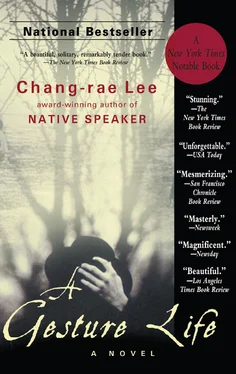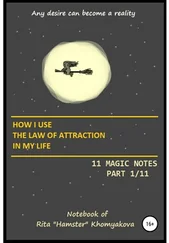“Mr. Hata,” she said warmly. “You must have a family for this big house.”
“Yes, I do.”
“I don’t know if I’ve ever seen your wife outside.”
“No, no, you wouldn’t have,” I told her, thinking immediately that I should say something about that. But the need had not arisen, at least in such a situation, and all I could do was speak with expedience. Later on, I did remark to her on once having a wife, this many years in the past, but I made clear by my tone that it wasn’t a subject that was very pleasing to me.
I said, “I’ve been alone for some time. But you may have seen my daughter. Sometimes she comes out with me, to garden.” My gaze naturally wandered to the far first-floor window of the study, where I thought I saw a movement behind the lace curtain.
Mary Burns went on nodding, smiling. “How I wish my daughters would visit me more on the weekends. What’s her name?”
“Sunny.”
“Tell me, Mr. Hata, is she a mother or is she working? My youngest just finished her last year of college, and she’s talking about working for ten years and then having children. Don’t you think that seems awfully late to start having children?”
“No, no,” I answered. “My daughter will be entering middle school in the fall.”
“Middle school?”
“Yes,” I said. “She’s eleven.”
Mary Burns was clearly confused, for it was obvious how near in age we were, in our fifties, and I quickly realized what an awkward situation I had placed her in. So I explained, “My daughter came to me four years ago, through a Christian adoption agency. I was very lucky to get her, being without a wife, and also because I’m somewhat older than is preferred. But I was able to convince the agency of my qualifications, and now I’m a happy father.”
“Oh, I see,” she said softly, brushing back loose ends of her wispy hair, which was fetchingly unkempt. “How wonderful for her, and for you. Truly. I sometimes wish that my children were as young as that again. What a rumpus they could cause. But it was worth every minute, as I’m sure you know.”
“Yes. It’s been very rewarding.”
I decided to invite her to inspect the more extensive garden behind the house, and she was plainly happy to follow me there, to walk among the perennials that I’d recently planted in what used to be a small croquet lawn, adjacent to the pool.
She bent to smell the lavender-colored flowers of the blooming rosemary bushes, and then moved on to the other ornamental and fragrant plants, and as she did I excused myself to go into the house. When I returned, I took the pair of snips I’d retrieved from the kitchen and quickly cut a small bundle of the rosemary and thyme for her to take home, wrapping it neatly with a stripped branch. She clasped the bunch gratefully and thanked me, and though it seemed I should invite her inside for a soft drink or tea (as she herself seemed to anticipate), I remembered it was near the hour for Sunny to begin her afternoon practicing, and I feared it might be a disturbance for her to have an unfamiliar woman in the house.
For it was around the same time that I began speaking to Sunny about the possibility of her having a mother; I suggested that with a woman living with us, perhaps she would be happier, or at least less inexplicably agitated and anxious-feeling than she was, which it seemed was becoming an increasingly everyday condition. I had aimed to learn of a suitable woman through old friends back in Japan, depending on a small network of comrades from the war for a reputable contact, but so few Japanese of good background and means wished to leave their country, especially in those boom days. My only real chance was to locate a childless widow who might consider an opportunity for motherhood reason enough to leave her homeland, and I hoped, too, that a congenial understanding and companionship would at some point arise between us, as it is never ideal for a child to sense ill-feeling between her parents. I had tried to convince Sunny of all this, for it seemed certainly wrong for a young girl to know only a single adult, especially so if it was a man, but always she was vehemently against the idea, crying and going on whenever I persisted. And though I didn’t do anything that day with Mary Burns to go against her wishes, it would be wrong to recall something other than a renewed lightness suffusing my spirit, a part of me which seemed, I was certain, to have been long ago dissipated, and lost.
Mary Burns, I know, was also surprised by the pleasantness of our meeting. She would later say I was gentle-seeming, and charming, and “exceedingly handsome,” if I remember her words correctly. I don’t know much about this; I’ve never thought — or even thought to think — of myself in such terms. And when she was even more comfortable with me, she confided how odd a recognition it was for her, at least at first, to find herself deeply attracted to an Oriental man. She laughed at herself and said there was no reason she shouldn’t have been, that there was no good reason at all, but the feeling was there and she ought to be truthful, and whether it was shameful or not probably didn’t matter in the end.
I agreed with her. Of course I didn’t say anything about my own particular attractions. My initial concern was about the exact nature of our relationship, what we might do, share — what might, in fact, eventually occur in the more private moments. Soon enough, my thoughts were focused on these notions, these heightened wonderings, and I fear I lost some perspective along the way for what my daughter Sunny may have needed, which was not necessarily a woman or a mother or anyone else.
Mary Burns, I want to say now, tried her best to connect with Sunny. She made great efforts toward building a friendship, when there was no expectation for her to do so. How many afternoons did she await Sunny at the bus stop, so that they might walk home together, climb the steady hill of Mountview Street? How many evenings did she come over to the house to visit with Sunny upstairs in her room, to chat and “hang out” with her, and then later help with her homework? How many Sunday afternoons did they spend together, at the children’s hour at Mary Burns’s country club, or at Jolene’s in the village for a treat of ice cream?
I remember when they would return from these outings, the front door creaking open, and Mary Burns would call out to say they were home. Her voice was always sprightly, aloft, but when I’d meet them in the foyer Sunny would be quickly ascending the stairs. I’d ask her if she had had fun, and she would answer, “Yes, Poppa, I did,” and then continue on her way up. I’d remind her to say thank you, but of course she had already, without fail, having made offerings to Mary Burns in the car and at the door, and she’d even curtly bow at the top of the stairs before disappearing down the hall to her room.
Afterward, Mary Burns and I would sit in the family room or the kitchen, sharing a snack or a pot of tea I’d prepared, and though she wouldn’t say anything I could see the disappointment ever settling in the fine lines of her face, her jaw perfectly steady. There was a sheerness, the smoothest rigor to her cheek, as if it were the keen wall of a canyon. And it was in these moments, strangely enough, that I believe I found her most arresting and lovely, that she appeared to me exquisitely composed in character, her bearing deliberate and unrelenting.
Only once did she break. After what she thought had been a particularly enjoyable day for them, full of shared gossip and even laughter, though with Sunny excusing herself as usual, Mary Burns began to cry. We were sitting on the family-room sofa. She cried very quietly, not covering her face, and at the very moment I thought she would come closer and lean on me, she rose and said she would be leaving.
Читать дальше











![William Frith - John Leech, His Life and Work. Vol. 1 [of 2]](/books/747171/william-frith-john-leech-his-life-and-work-vol-thumb.webp)
![William Frith - John Leech, His Life and Work, Vol. 2 [of 2]](/books/748201/william-frith-john-leech-his-life-and-work-vol-thumb.webp)